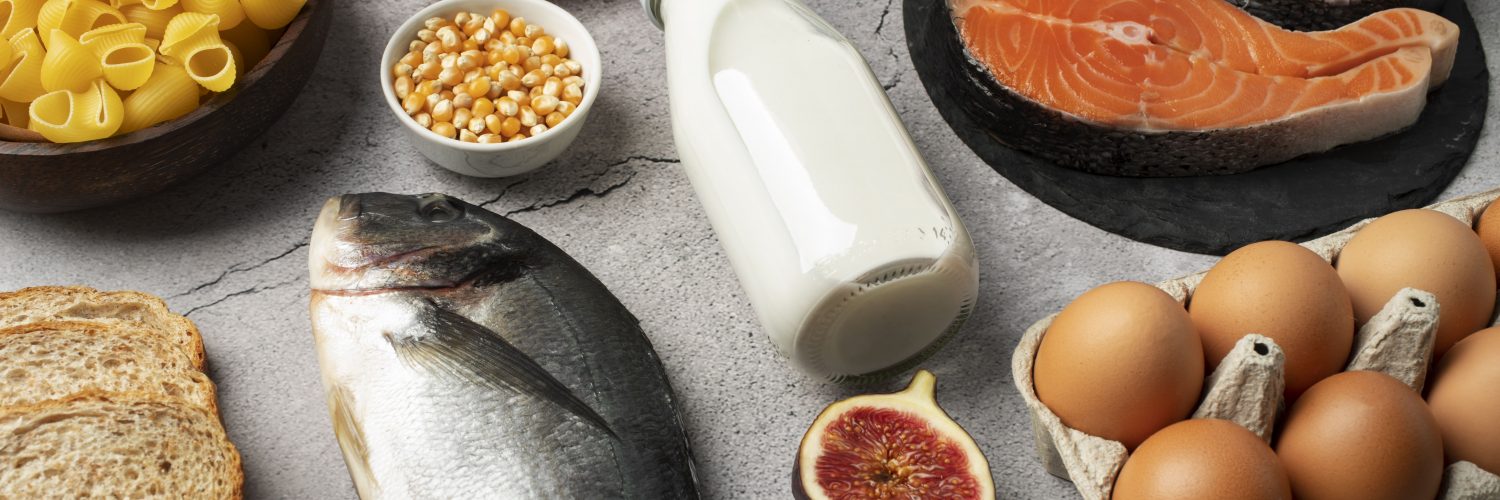This essay will discuss the fascinating Halacha of eating fish and milk together, though the focus of the discussion intriguingly does not relate to Halachic minutiae but to whether the Halacha exists at all! Does this combination constitute a danger to health and is it forbidden?
The Mishna in Chulin (103b) states:
It is forbidden to cook any type of animal flesh with milk, except for fish and locusts. It is forbidden to put [any animal flesh] on the table together with milk, except for fish and locusts.
In other words, not only is it forbidden to cook meat and milk together, but it is even forbidden to place them together on the table while eating.
The Mishna is clear that there is no Issur of cooking fish with milk, but may one eat them together? If it was permissible, the Mishna should surely have said so explicitly and not merely permitted placing them on the table together (which is a lesser Issur).
However, this proof can be rejected based on a comment of the Ran. He explains that by permitting the cooking of fish and milk together, the Mishna also means to permit eating them together, because the Issur to eat Basar v’Chalav is derived from the words “Lo Sevashel Gedi b’Chalev Imo – Do not cook a calf in its mother’s milk”. This is also the position of other Rishonim, including the Ramban, Rashba, Ritva, and Rambam (Hilchos Ma’achalos Asuros 9:5).
Still, it may not be so straightforward to permit eating fish and milk together. Two questions must be addressed:
- Is fish considered “Basar”, which the Torah forbids to eat with milk?
- Is there any Sakana in eating fish and milk together?
The Rishonim only discuss the first question, and since they conclude that fish is not considered Basar, they struggle to explain why the Mishna did not explicitly permit eating fish and milk together. However, if eating fish and milk constitutes a Sakana, the Mishna can be explained more easily:
- There is no Issur to cook fish and milk together as cooking does not pose a Sakana.
- There is no Issur to place them on the table together.
- It is, however, forbidden to eat them together because of Sakana.
The Tiferes Yaakov (Chulin ibid.), who has a similar approach, discusses why it is permissible to place fish and milk together on the table given that it is forbidden to eat them together due to Sakana. [We should point out that there is a Machlokes Tana’im concerning chicken and milk as to whether they may be placed on the table together. The Halacha is that it is forbidden, even though eating chicken and milk together is only an Issur d’Rabbanan. This is why the Tiferes Yaakov entertains the thought that this should also apply to fish and milk.] He answers that the Issur to place meat or chicken on the table together with milk is intended to prevent a person from violating the Issur of eating them together. This is unnecessary in the case of a Sakana since a person is naturally careful to avoid things that pose a danger to his life.
Whether eating fish and milk together constitutes a Sakana is subject to a centuries-old Machlokes.
The Beis Yosef states (Y.D. 87):
It is permissible to eat fish and locusts with milk (Tur). [It is stated] at the beginning of Perek Kol haBasar (103b): “It is forbidden to cook any type of animal flesh with milk, except fish and locusts.” The Ran states (37a b’Dapei haRif) that since it is permissible to cook them (the fish) [together with milk], it is implied that it is also permissible to eat them with milk, because the Torah expresses the Issur of Basar v’Chalav with the word “Bishul”. This is also stated by the Rambam and Rashba (Toras haAdam)… Nevertheless, one should not eat fish and milk because of the Sakana, as evident from Orach Chaim 173.
Intriguingly, Orach Chaim 173 does not discuss the subject of eating fish and milk together. Instead, it discusses the obligation to wash one’s hands between eating fish and meat because eating them together can cause a person to contract Tzara’as. Where did the Beis Yosef detect any discussion of eating fish and milk? This question is raised by the Rema (Darchei Moshe 4):
In my life, I have not seen people be scrupulous about this. Orach Chaim 173 only mentions not to eat [fish] with meat due to Sakana but with milk it is permissible… therefore it seems that the Beis Yosef mixed in [the Halacha of] meat and milk.
In other words, the Rema held that a mistake appears in the Beis Yosef’s comments. However, this contention requires further scrutiny. Does the Rema mean that the Beis Yosef mistakenly wrote the wrong words and did not mean to forbid eating fish and milk together? This seems unlikely because the Beis Yosef is discussing eating fish and milk and states explicitly that although it should be permissible (because fish is not “Basar”) it is forbidden due to Sakana. However, the Magen Avraham (Introduction to Siman 173) quotes the Darchei Moshe as saying that a “Ta’us Sofer – a mistake by a printer or publisher” appears in the Beis Yosef; the text should read “meat and fish”, not “milk and fish”. This requires further study.
The Levush – one of the Ashkenazi Gedolei haPoskim in the generation after the Beis Yosef and Rema – concurs with the Beis Yosef and forbids eating fish and milk together. The Shach (Y.D. 87:5) disagrees:
In truth, he follows the Beis Yosef who write that. But it is a mistake because it is only mentioned there that fish with meat is forbidden because of Sakana, but we did not hear or see anything about milk. Every day we are accustomed to cooking fish in milk and eating it! The Darchei Moshe also challenges the Beis Yosef like this. The Sefer B’eir Sheva (p. 100) and other Acharonim similarly challenge him on this… this is clear.
Like the Rema, the Shach outlines the greatest challenge to the Beis Yosef’s ruling: the absence of any tradition prohibiting eating fish with milk. The Rema states that, “In my life, I have not seen people be scrupulous with this”, and the Shach states, “Every day we are accustomed to cooking fish in milk and eating it!”
We can seemingly support this position from the comments of the aforementioned Rishonim who say that fish is not considered Basar and thus is not subject to the Issur of Basar b’Chalav, but who do not point out that it is still forbidden in practice to eat fish and milk together because of Sakana. It seems very unlikely that the Rishonim would explain a principle in Basar b’Chalav but fail to mention that it has no practical ramifications. Even if one argues that they merely sought to explain the Mishna and not to render Halachic rulings, this cannot possibly be true of the Rambam who explicitly permits eating fish and milk in Mishna Torah – which is a Sefer of Halachic rulings.
We should also point out that the Rambam was an expert physician. Elsewhere, he enumerates many foods that a person should not eat because they constitute a Sakana or are bad for one’s health; he tended to adopt stringent positions regarding guarding one’s health. But yet he does not see fit to mention that there is any Sakana in eating fish and milk together!
Before we continue exploring the positions of the Poskim, we will review two Gemaros that are used to adduce proof for leniency:
The first proof is brought by the Shach from the Gemara in Pesachim (76b) that states: “R’ Kahana [the] son of R’ Chinena Saba taught: Bread that was baked together with roasted meat in the oven [may not be eaten] with Kutach (a food containing milk)” because the bread would have absorbed some of the scent of the meat. The Gemara continues: “A fish that was roasted together with meat – Rava from Parzika forbade it to be eaten together with Kutach”, for the same reason as above. “Mar bar Rav Ashi said: It is even forbidden to eat it with salt”, meaning, one should not eat any fish that was cooked together with meat, “because it can cause Tzara’as and halitosis.”
The Gemara implies that the only reason to forbid eating a dairy dish together with fish that had been roasted with meat is the mixture of meat and milk. If the fish had been roasted by itself, it would be permissible to eat it with milk.
Moreover, Mar bar Rav Ashi states that fish roasted with meat should not be eaten at all due to the Sakana of mixing fish and meat. If there was a Sakana in eating fish with milk, Mar bar Rav Ashi should have added that there would be Sakana even if the fish was not roasted with meat. In other words, this Gemara clearly indicates that eating fish with milk is neither a violation of the Issur of Basar v’Chalav nor a Sakana.
The Prisha brings a second proof from a Machlokes between Rav and Shmuel Gemara in Chulin (111b) whether fish cooked in a clean meat pot can be eaten with dairy food. The Halacha is that it is permissible. This seems to be explicit proof that one may eat fish together with dairy.
These are strong proofs; it is difficult to understand how the Beis Yosef could rule otherwise. In addition, the Beis Yosef himself does not rule in Shulchan Aruch that it is forbidden to eat fish and milk!
Does eating fish and milk together pose an actual Sakana? There are several interesting statements made by the Poskim in this regard.
The Pischei Teshuva (ibid. 9) cites the Shu”t Adnei Paz[1] who unearthed a comment of Rabbenu Bachya on Parshas Mishpatim (23:19). Rabbenu Bachya has a fascinating approach (which we have explored in the past[2]) to explaining the nature of the foods forbidden by the Torah. He maintains that they either pose a Sakana or harm a person’s health. After describing the Sakana inherent in Basar v’Chalav, he states: “This is also the view of physicians regarding a mixture of fish and cheese cooked together. They produce an evil disposition and the disease of Tzara’as.”
The Pischei Teshuva also cites the Shu”t Chinuch Beis Yehuda[3] (61), “who upholds the words of the Levush that it is forbidden to eat [fish] with milk because it was investigated by the wise physicians [and they determined] that it is only permissible to eat fish fried in butter, whereas fish cooked in milk can cause a danger of illness, because fish cool [a person] down a lot, and milk is also bad and harms the body.”
This is a fascinating comment. However, the Chasam Sofer dismisses it in a Teshuva (101), given that the Rambam, who was an expert physician, explicitly permits eating fish and milk.
The K’neses haGedola (Hagahos to the Beis Yosef, ibid.) elaborates on the topic. He opens his discussion with the observation that “All those who came after the Beis Yosef question him on this.” He then cites the Sefer Sh’eiris Yehuda that states: “It is true that I heard from physicians that eating fish and milk also poses the risk of Tzara’as”.
He goes on to resolve the question posed by the Poskim as to why the Beis Yosef appears to find support for his position in a ruling in Orach Chaim given that the context there is fish and meat and not fish and milk. According to the K’neses haGedola, the Beis Yosef’s intent is that the reason for the Issur of milk and fish is the same as that of fish and meat, namely the risk of contracting Tzara’as. [This idea may be consistent with the aforementioned comment of Rabbenu Bachya that eating fish and milk together can lead a person to contract Tzara’as.]
What is the Halacha l’Ma’aseh? There are two main approaches. The first – which is the Minhag of Ashkenazim today – is to have no qualms about eating fish and milk together, as explained by the Pischei Teshuva. Since this has been the custom, it is legitimate to continue acting in this way – “Shomer Pesa’im Hashem”.
The second approach – which is the Minhag of Sefardim – is to avoid eating fish and milk together due to the concern of Sakana, as per the basic understanding of the Beis Yosef’s comments. Since “Chamira Sakanta me’Issura” we must exhibit more care about a possible danger to life than we would for a regular Issur. This position is expressed, for example, by the Kaf haChaim (Y.D. 87:24).
[1] R’ Efraim b. Shmuel Zanvil Heksher of Altoona (c. 1680-1759). Shu”t Adnei Paz was published in 1743.
[2] Shemini 5780
[3] R’ Yehuda Leib b. Chanoch (1645-1705) of Pfersee (Augsburg, Germany), Av Beis Din of Schnaittach













Add comment